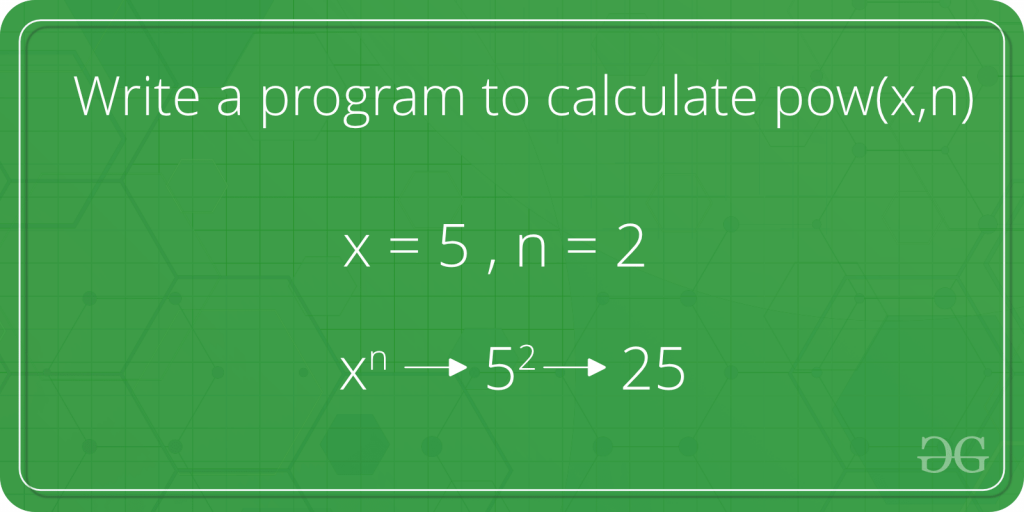C++ Program To Calculate the Power of a Number
Last Updated :
13 Oct, 2023
Write a C++ program for a given two integers x and n, write a function to compute xn. We may assume that x and n are small and overflow doesn’t happen.
Examples :
Input : x = 2, n = 3
Output : 8
Input : x = 7, n = 2
Output : 49
Program to calculate pow(x, n) using Naive Approach:
A simple solution to calculate pow(x, n) would multiply x exactly n times. We can do that by using a simple for loop
Below is the implementation of the above approach:
C++
#include <bits/stdc++.h>
using namespace std;
long power(int x, unsigned n)
{
long long pow = 1;
for (int i = 0; i < n; i++) {
pow = pow * x;
}
return pow;
}
int main(void)
{
int x = 2;
unsigned n = 3;
int result = power(x, n);
cout << result << endl;
return 0;
}
|
- Time Complexity: O(n)
- Auxiliary Space: O(1)
pow(x, n) using recursion:
We can use the same approach as above but instead of an iterative loop, we can use recursion for the purpose.
C++
#include <bits/stdc++.h>
using namespace std;
int power(int x, int n)
{
if (n == 0)
return 1;
if (x == 0)
return 0;
return x * power(x, n - 1);
}
int main()
{
int x = 2;
int n = 3;
cout << (power(x, n));
}
|
- Time Complexity: O(n)
- Auxiliary Space: O(n) n is the size of the recursion stack
To solve the problem follow the below idea:
There is a problem with the above solution, the same subproblem is computed twice for each recursive call. We can optimize the above function by computing the solution of the subproblem once only.
Below is the implementation of the above approach:
C++
#include <bits/stdc++.h>
using namespace std;
int power(int x, unsigned int y)
{
int temp;
if (y == 0)
return 1;
temp = power(x, y / 2);
if (y % 2 == 0)
return temp * temp;
else
return x * temp * temp;
}
int main()
{
int x = 2;
unsigned int y = 3;
int result = power(x, y);
std::cout << result << std::endl;
return 0;
}
|
Time Complexity: O(log n)
Auxiliary Space: O(log n), for recursive call stack
Extend the pow function to work for negative n and float x:
Below is the implementation of the above approach:
C++
#include <bits/stdc++.h>
using namespace std;
float power(float x, int y)
{
float temp;
if (y == 0)
return 1;
temp = power(x, y / 2);
if (y % 2 == 0)
return temp * temp;
else {
if (y > 0)
return x * temp * temp;
else
return (temp * temp) / x;
}
}
int main()
{
float x = 2;
int y = -3;
cout << power(x, y);
return 0;
}
|
Time Complexity: O(log |n|)
Auxiliary Space: O(log |n|) , for recursive call stack
Program to calculate pow(x,n) using inbuilt power function:
To solve the problem follow the below idea:
We can use inbuilt power function pow(x, n) to calculate xn
Below is the implementation of the above approach:
C++
#include <bits/stdc++.h>
using namespace std;
int power(int x, int n)
{
return (int)pow(x, n);
}
int main()
{
int x = 2;
int n = 3;
cout << (power(x, n));
}
|
Time Complexity: O(log n)
Auxiliary Space: O(1), for recursive call stack
Program to calculate pow(x,n) using Binary operators:
Some important concepts related to this approach:
- Every number can be written as the sum of powers of 2
- We can traverse through all the bits of a number from LSB to MSB in O(log n) time.
Illustration:
3^10 = 3^8 * 3^2. (10 in binary can be represented as 1010, where from the left side the first 1 represents 3^2 and the second 1 represents 3^8)
3^19 = 3^16 * 3^2 * 3. (19 in binary can be represented as 10011, where from the left side the first 1 represents 3^1 and second 1 represents 3^2 and the third one represents 3^16)
Below is the implementation of the above approach.
C++
#include <iostream>
using namespace std;
int power(int x, int n)
{
int result = 1;
while (n > 0) {
if (n & 1 == 1)
{
result = result * x;
}
x = x * x;
n = n >> 1;
}
return result;
}
int main()
{
int x = 2;
int n = 3;
cout << (power(x, n));
return 0;
}
|
Time Complexity: O(log n)
Auxiliary Space: O(1)
Program to calculate pow(x,n) using math.log2() and ** operator:
Here, we can use the math.log2() in combination with the operator “**” to calculate the power of a number.
Below is the implementation of the above approach.
C++
#include <cmath>
#include <iostream>
using namespace std;
int calculatePower(int a, int n)
{
return round(pow(2, (log2(a) * n)));
}
int main()
{
int a = 2;
int n = 3;
cout << calculatePower(a, n) << endl;
return 0;
}
|
Time Complexity: O(1)
Auxiliary Space: O(1)
Please refer complete article on Write program to calculate pow(x, n) for more details!
Like Article
Suggest improvement
Share your thoughts in the comments
Please Login to comment...